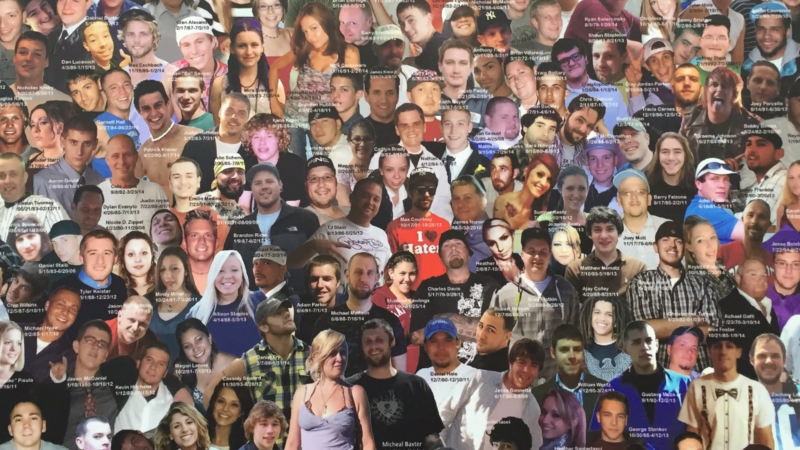This week we learnt that illegal drug-related deaths have now been at or near record levels for five years in a row. Thankfully, policy is shifting.

Pic via Anyone’s Child.
“It may even be worth a look at experimenting with decriminalisation.” The Sun, 8th Aug 2018.
Few readers of this blog will read The Sun. But I’m sure you will get the significance of a potential shift from the UK’s biggest-selling newspaper.
The abject and irrefutable failure of our prohibitionist approach to illegal drugs has left the government with nowhere to hide.
With 2503 deaths last year, illegal drug-related deaths have now been at or near record levels for five years in a row (some of the victims are pictured above). You could fill Stamford Bridge stadium with the victims since 2000: the majority poor, vulnerable marginalised people.
In contrast countries like Portugal – which decriminalised drug possession in 2001 and put the money saved into health – now has a drug-related death rate less than 1/25th that of the UK.
And every death leaves a family bereaved. That is why Anne-Marie Cockburn from our Anyone’s Child Project challenged the Prime Minister to: “Stand by my child’s grave, and tell me your drug policy is working.”
Cocaine, heroin and cannabis are now purer, stronger and more available than ever. ‘Spice’ is ravaging the homeless. Policy should really be about reducing harm – who cares if people are using drugs harmlessly? – but in any case use hasn’t fallen for almost ten years.
But happily, change is happening.
If you go to Boomtown festival this weekend, ‘The Loop’ will be there to test your drugs so you know what is in them and how strong they are. And in July, after long opposing drug safety testing, the Home Office OK-ed it.
And after hospitalising a child by taking their medicine, the Home Secretary has allowed medical cannabis to be more widely available.
Police forces across the country are exploring ‘diversion schemes’. Those caught with drugs for their own use do not get a criminal record, instead they get support, education or treatment if they need it.
This was recommended by David Lammy’s review into the appalling racial disparities in the criminal justice system. Reoffending (of all types) is reduced, and it saves police time. A lot of it.
Glasgow is opening a heroin prescribing clinic for people who have tried other treatments unsuccessfully – with the government’s blessing, because Switzerland’s experience shows this reduces deaths, HIV infections from needle sharing, and acquisitive crime to pay for drugs.
More progress is needed. Treatment groups and the NHS want to open clean spaces where people can use street drugs under the eye of trained staff. No one has ever died from an overdose in one of these supervised drug consumption rooms anywhere in the world.
But the Home Office is blocking them. And drug treatment budgets have been cut by 26% nationally in two years. That is killing people.
What we really need is an approach that takes the trade out of the hands of criminals, and ensures people know what they are taking – to have health advice and dosage instructions on the packaging; and to ensure people are not afraid they will be stigmatised or criminalised if they seek help. Oh, and an approach that doesn’t destabilise poor producer countries.
Which brings me to ask, have you ever considered how nonsensical the government mantra: “Drugs are dangerous. That’s why they are illegal” is?
“Unprotected sex is dangerous. That’s why it is illegal.” No it isn’t, we have sexual health education, quality controlled condoms, and healthcare if things go wrong.
“Rock-climbing is dangerous. That’s why it is illegal.” No: signs warn if cliffs are unstable, we regulate equipment, and have outdoor centres where people learn to climb more safely. No one is frightened to call for help if their friend falls, in case they are arrested.
Tobacco is a dangerous drug. But we have halved use, reduced deaths through education, regulations on packaging, price controls and prescribing nicotine to help people stop.
So the answer is to legalise and regulate drugs – and that is happening. From cannabis across the Americas, to heroin prescribed in clinics in Europe and other parts of the world.
Because no drug is safer left in the hands of criminals and unregulated dealers, the mantra should be: “Drugs are dangerous. That’s why we legally regulate them”.
Martin Powell is Head of Campaigns and Communications at the Transform Drug Policy Foundation.
To reach hundreds of thousands of new readers we need to grow our donor base substantially.
That's why in 2024, we are seeking to generate 150 additional regular donors to support Left Foot Forward's work.
We still need another 117 people to donate to hit the target. You can help. Donate today.



